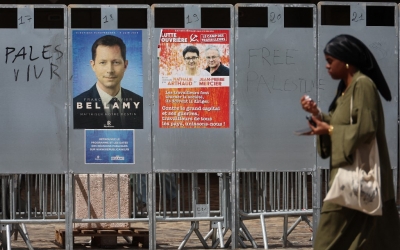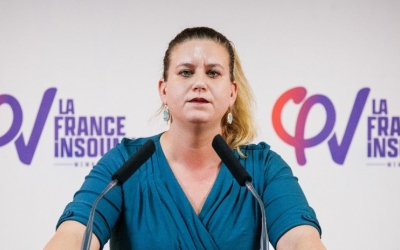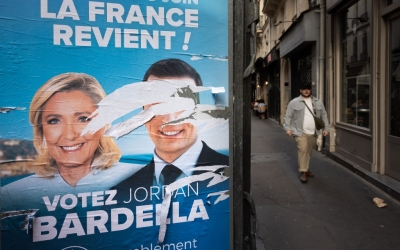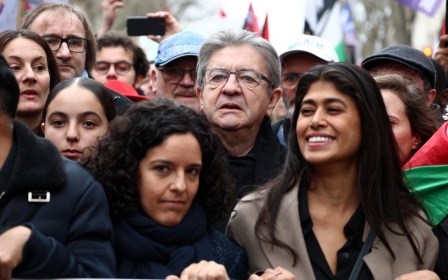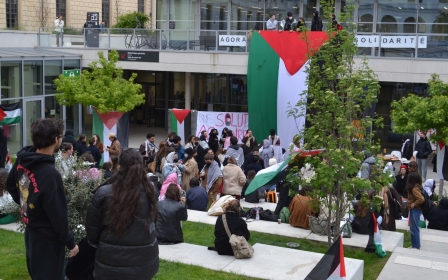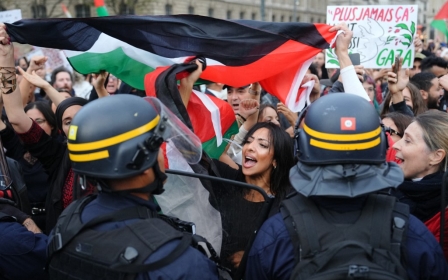Who is Rima Hassan, the first French-Palestinian to become a European MP?
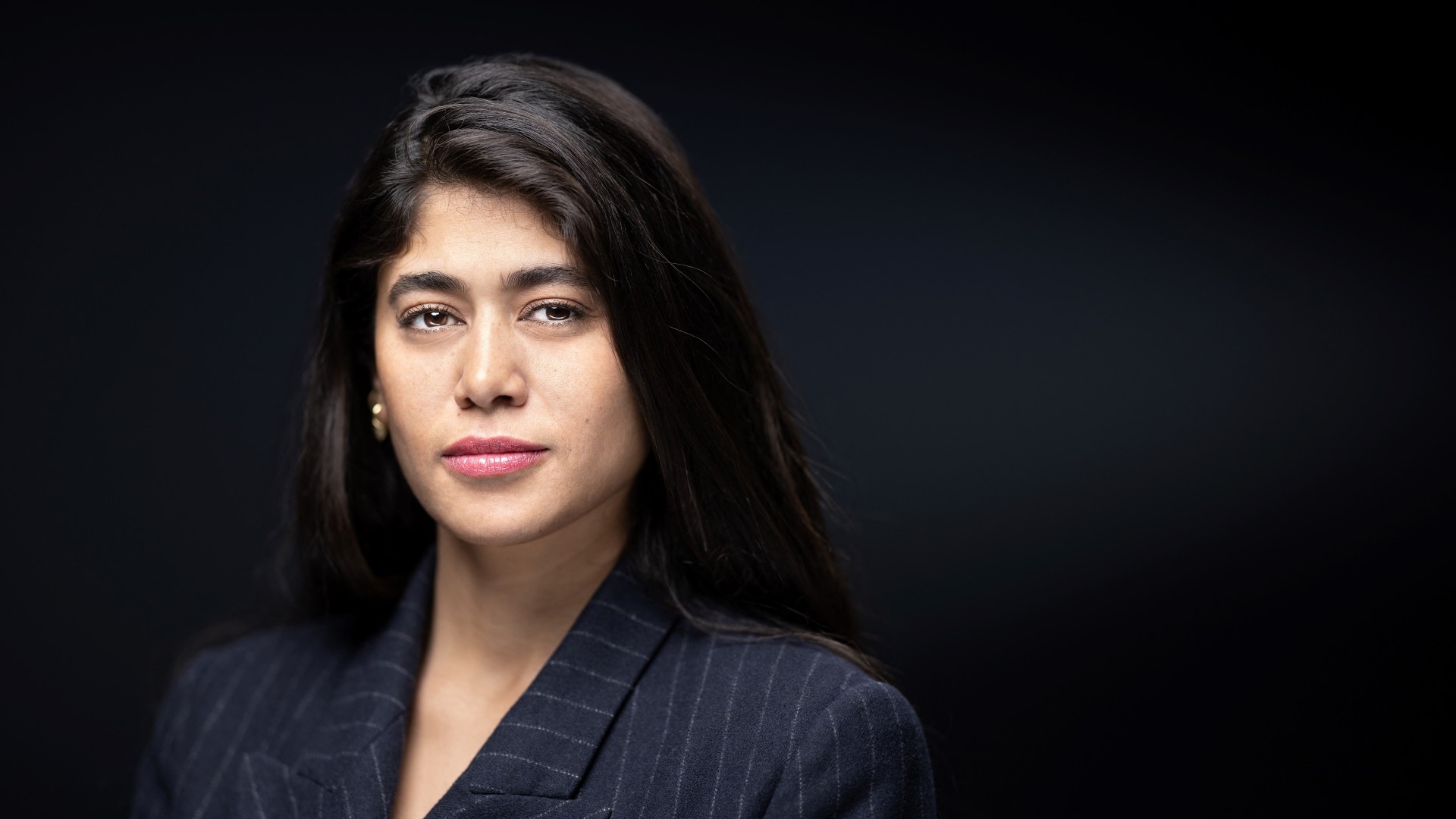
Rima Hassan, a 32-year-old legal scholar and activist, has made history by becoming the first French-Palestinian member of the European parliament.
Her party, the left-wing France Unbowed (La France Insoumise, LFI), obtained 9.89 percent of the votes cast on Sunday and is now sending nine MEPs to Brussels. The European elections in France were won by the far-right party National Rally (Rassemblement National, RN), which got 31.37 percent of the votes, translating to 30 of the 81 French seats.
Unknown to the general public a few months ago, Hassan, a specialist in international law, quickly gained notoriety and popularity among the LFI grassroots by being at the forefront of the defence of the Palestinian cause, condemning Israel’s occupation and war on Gaza.
Often seen with a keffiyeh wrapped around her shoulders - “my superhero cape”, as she described it - Hassan is the granddaughter of Palestinians made refugees in the 1948 Nakba. She has been one of the discoveries of the EU campaign, acclaimed by pro-Palestinian demonstrations and demonised by supporters of Israel.
Hassan has used the visibility offered by her candidacy to denounce the “genocide” committed by Israel in Gaza, accusing the state of being a “nameless monstrosity”, a “fascist colonial entity” which “lies every day”.
New MEE newsletter: Jerusalem Dispatch
Sign up to get the latest insights and analysis on Israel-Palestine, alongside Turkey Unpacked and other MEE newsletters
Now in Brussels, she will be able to work on her objectives to see Europe “recognise Palestine as a state to counter Israel’s colonisation plans, impose economic sanctions by suspending the EU-Israel Association Agreement, enforce an arms export embargo for human rights violations, and implement diplomatic and political sanctions on Israel akin to those on apartheid South Africa until international law is upheld”.
Born stateless
Hassan was born stateless in April 1992 in Syria to a family who fled during the Nakba (“catastrophe” in Arabic), when around 750,000 Palestinians were ethnically cleansed from their home by the Zionist forces to make way for the creation of Israel in 1948.
Three of her grandparents are Palestinian. Her paternal side of the family originated from the village of al-Birwa located 10.5km east of Acre, in present-day northern Israel.
She spent her childhood in the Neirab refugee camp in the suburbs of Aleppo, before emigrating to France and the western city of Niort at the age of 10, via family reunification. She obtained the French nationality at the age of 18.
“I didn’t speak a word of French. It happened that students called me towelhead,” she told French media in May 2022.
Later, Hassan studied law and pursued a master’s degree in international law from Paris’ Sorbonne University, writing her thesis on apartheid in South Africa and Israel.
In 2019, she founded the Refugee Camp Observatory, an NGO dedicated to studying camps around the world and raising awareness about their living conditions and the violations of refugees’ rights.
“I remember a brouhaha, promiscuity, permanent tension. Everyone had their nerves on edge,” she recalled about her experience living in what she called “non-places”.
After she became rapporteur at the National Court of Asylum (CNDA), in 2022, the Interministerial Delegation for the Reception and Integration of Refugees, a governmental body, honoured her as an “inspiring woman”.
In 2023, Hassan joined the Diversity, Equity and Inclusion Advisory Council at cosmetics firm L’Oréal, but her anti-Israeli positions have since led to her suspension.
The encounter between Hassan, who once said she "came from a communist family", and LFI took place at the party’s conference last summer, when the media were not yet interested in her.
“The Palestinian question was not even in the news at the time, and still, [LFI] had put it at the heart of its training material for activists. For me, joining them was the obvious [choice],” she said in an interview.
After the Hamas-led attacks on Israel on 7 October and the subsequent Israeli war on Gaza, she was contacted by LFI to join its list for the EU elections. She was placed seventh on its list of candidates.
‘Real persecution’
Hassan's outspoken condemnation of Israeli policies towards the Palestinians set her against a wide range of people, including on the left of the political spectrum.
Hassan - and LFI in general - have regularly been accused of antisemitism for their pro-Palestine comments, in a common conflation used against those who criticise Israeli violations.
In March, after fierce criticism from public figures, including the popular French television producer and host Arthur, the 2023 “Forbes France Women of the Year” ceremony in Paris was cancelled.
The American magazine had selected Hassan among “40 remarkable women who marked the year” and managed to “break the glass ceiling”.
“Don’t be surprised to see the antisemite Rima Hassan honoured among the 40 women of the year 2023. Antisemitism and the apology of terrorism are the new symbols of success at Forbes,” Arthur wrote on Instagram.
In April, Hassan and LFI leader Mathilde Panot were summoned by police as part of an investigation into “terror apology”, following an LFI statement published on 7 October.
The statement drew a parallel between the Hamas-led attack, described as "an armed offensive by Palestinian forces", and "the intensification of the Israeli occupation policy" in Palestine.
In an interview at the end of November to Le Crayon, Hassan said it was "true" that Hamas carried out legitimate action. She later denounced a misleading editing of her response.
“I believe I have nothing to reproach myself for, having always expressed myself critically both towards Hamas and its terrorist mode of operation, but also towards Israel,” she told AFP the day she was summoned by the police.
Yonathan Arfi, the president of the Representative Council of Jewish Institutions of France (CRIF), a pro-Israel group, accused her of “follow[ing] the agenda of the fundamentalists of Hamas and justifying the abuses of 7 October”.
On her social media accounts, Hassan has shared numerous sexist and racist threats and insults she has received on a daily basis.
She reported having filed eight complaints over three months of campaigning and initiated proceedings to ensure her freedom of expression.
In February, more than 500 political figures, including Panot and former Palestinian ambassador Leila Shahid, signed a letter in support of Hassan and other pro-Palestinian voices, who they said “suffer real persecution from pro-Israeli organisations and personalities” and a “barrage of insults and threats”.
“Soldiers of the colonial occupation forces went so far as to inscribe, on several occasions, [Hassan’s] name on Israeli bombs,” they wrote.
Parallel with France’s own history
Hassan has also been criticised for her use of the slogan "from the river to the Mediterranean", a popular and longstanding Palestinian call for equality and freedom that is deemed by some critics as associated with the destruction of Israel.
“My demand is equal rights from the Jordan to the sea for Israelis and Palestinians,” she responded, adding that she “absolutely does not” call into question the existence of Israel.
She explained that, before joining the LFI list, she was in favour of a binational state. Since then, she has aligned herself with the position of the party - and the vast majority of the political class - in favour of the two-state solution.
“I respect the idea of the Jewish national home. I don’t even have a problem with it being in Palestine. I have a problem with the second leg of Zionism, i.e. colonialism,” she explained.
Her struggle against colonialism has led her to establish a link between the issue of Palestine and the situation of the descendants of immigrants in France.
“How can we look at colonised Palestine if we have not deigned to look at our own [French] colonial history?” she asked during a meeting a few days before the vote.
“Many western countries, including France, have not fully confronted their colonial pasts, exemplified by France’s reluctance to address its history in Algeria,” she recently told Al Jazeera.
Following her election, Hassan told French media that she vowed to make Gaza the "first subject" on which she would work.
"I think [the victory] will hit me when I call my father, who still lives in the Neirab camp," she commented.
Middle East Eye delivers independent and unrivalled coverage and analysis of the Middle East, North Africa and beyond. To learn more about republishing this content and the associated fees, please fill out this form. More about MEE can be found here.


